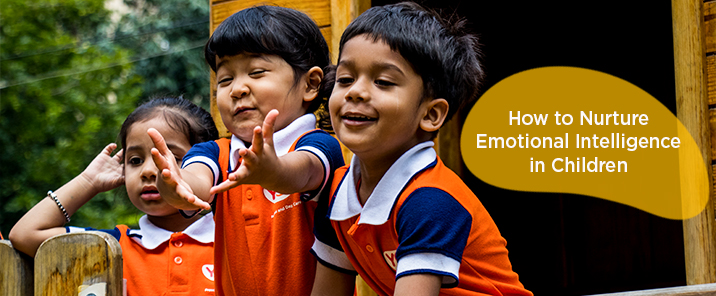Admissions Open For Yello 2024-2025 Limited SeatsContact Us: +918748995555
Admissions Open For Yello 2024-2025 Limited SeatsContact Us: +918748995555

Posted on 02 March 2020 by Admin |  3 min read
3 min read
You would have probably come across the term "emotional intelligence" many times but what exactly is emotional intelligence? Why is it important to develop emotional intelligence in children?
Let us suppose your child is finding difficulty with his math homework. Instead of yelling and giving up, he expresses how frustrated he is and asks you for help. Or your kid’s friend cancels their plans to hang out due to some unavoidable reasons. Your child understands why his friend doesn’t feel like socializing and makes other plans. These responses are signs of an important set of skills that are commonly known as “Emotional Intelligence”(EI). Developing emotional intelligence aids your child to contribute to a team environment professionally and personally as well as possess the ability to develop strong, connected relations in life.
What is Emotional Intelligence?
Emotional Intelligence is the ability to be smart about our own and other’s feelings. This involves being able to notice, understand and act on emotions in an effective way. It is a set of skills that should be nurtured in children from a very young age.
Signs of an Emotionally Intelligent Child
How to improve emotional intelligence in Children?
1. Acknowledge your Child’s Perspective and Empathize
Being understood helps humans to let go of troubling emotions. We all store up emotions and then let ourselves experience them once we find a safe haven so that we are free to move on.
When your child is upset and if his/her emotions seem to be a bit on the dramatic side, you would try to console them. Validating their feelings and showing empathy in such a situation would be a better approach. When your child sees that you understand how they are feeling on the inside, they would feel less compelled to show you their feelings through behavior. So, rather than yelling and crying to show you that he/she is angry, they will feel better when you have made an attempt to understand them.
2. Label Your Child’s Emotions
Kids need to know how to recognize their feelings. Words such as angry, upset, shy, pain, joy, excited, thrilled, and hopeful builds a vocabulary to express their feelings. When they feel upset/discouraged, ask them to describe what they are feeling or ask them to write it down or draw it. Doing this often lets them know what it feels like to be sad or angry or frustrated. Also, they will learn to name their own emotions.
3. Teach Problem Solving
When obstacles and problems come their way, help your child understand that it is better to understand the problem and address it piece by piece than being saddened by it.
Teach children to breathe through and feel the problem, tolerate them without acting on them, and solve the problems. Sometimes, when kids feel that their emotions are understood and accepted, their feelings lose the charge and begin to dissipate. This leaves an opening for problem-solving. While some kids can do this by themselves, some kids might need their parent’s help to brainstorm. Problem-solving skills go a long way ahead in life.
4. Teach Healthy Coping Skills
Once children understand their emotions, they should learn how to deal with those emotions in a healthy way. Knowing how to calm down, cheer up, or face their fears all by themselves can be complicated for little ones.
Teach specific skills. For instance, teach your child how to take a few deep breaths when he/she is angry to calm themselves body down.
Help your child create a kit that includes things like a coloring book, a favorite joke book, soothing music, and so on to help them regulate their feelings by engaging their senses. Put these items in a special decorative box. And, when he/she is upset, remind them of this calm down kit to manage their emotions.
An emotionally intelligent lid grows up to be a good individual in the future. They possess a sense of self, the ability to empathize with others, social skills that are useful for life. Try these tips to make your little one emotionally intelligent and see them grow into a kind person. Grab educational kits for your child and activate their other dormant talents.
Back to Blog